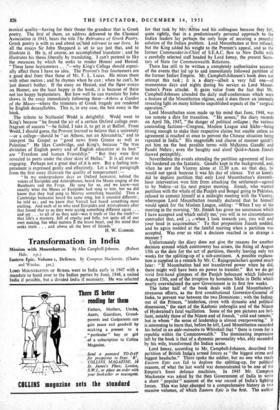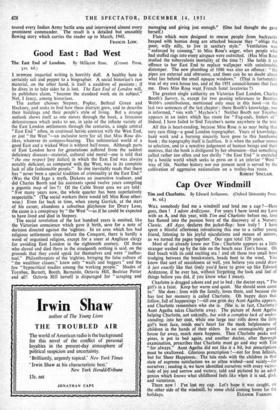Transformation in India
Mission with Mountbatten. By Alan Campbell-Johnson. (Robert Hale. 2 SS.) Loan MoutsrraArrEN OF BURMA went to India early in 1947 with a mandate to hand over to the Indian parties by June, 1948, a united India if possible, but a divided India if necessary. He was selected for that task by Mr.4--Attlee and his colleagues because they felt, quite rightly, that in a predominantly personal approach to the Indian leaders lay perhaps the only hope of securing a peaceful solution of the Indian problem. Lord Mountbatten at first refused, but the King-added his weight to the Premier's appeal, and so the former Commander-in-Chief of S.E.A.C. flew to New Delhi with a carefully selected staff headed by Lord Ismay, the present Secre- tary of State for Commonwealth Relations.
There has still to be written a completely authoritative account of the events that led up to and immediately followed partition of the former Indian Empire. Mr. Campbell-Johnson's book does not attempt this task ; it is a diary—albeit a very full one—of momentous days and nights during his service as Lord Mount- batten's Press attache. It gains value from the fact that Mr. Campbell-Johnson attended the daily staff-conferences which were a feature of the Mountbatten regime, and it does throw an intensely revealing light on many hitherto unpublished aspects of the" surgical operation."
Lord Mountbatten soon made up his mind that. June, 1948, was too remote a date for transition. "He senses," the diary records on April 5th, 1947, " the-clanger of political collapse; the various contending factions—Congress, Moslem League and Sikhs—being strong enough to stake their respective claims but unable unless an agreement is reached at once to prevent the Chinese situation being repeated in India." His magnetisM and charm of manner quickly put him on the best possible terms with MaKatma Gandhi and Pandit Nehru ; even the haughty and aloof Qaid-e-Azarst- Jinnah thawed perceptibly.
Nevertheless the events attending the partition agreement of June 3rd bordered on the fantastic. Gandhi kept in the background, and, when he saw the Viceroy alone at 12.30 a.m. on that day, he would not speak because it was his day of silence. Yet so keenly did he deplore partition that only Lord Mountbatten's eleventh- hour intervention won him from attacking the settlement—agreed to by Nehru—at his next prayer meeting. Jinnah, who wanted partition with the whole of the Punjab and Bengal going to Pakistan, refused to commit himself at a midnight meeting with the Viceroy, whereupon Lord Mountbatten roundly declared that he himself would speak for the Moslem League, adding: "When I say at the meeting in the morning, 'Mr. Jinnah has given me assurances which I have accepted and which satisfy me,' you will in no circumstances contradict that,_and . . . when I look towards you, you will nod your head in acquiescence." To that proposition Jinnah nodded, and he again nodded at the fateful meeting when a partition was accepted. Was ever so vital a decision reached in so strange a manner ?
Unfortunately the diary does not give the reasons for another decision around which controversy has arisen, the fixing of August 15th as the date for the act of partition, thereby leaving only ten weeks for the splitting-up of a sub-Continent. A possible explana- tion is supplied in a remark by Mr. C. Rajagopalachari quoted much later: "If Mountbatten had -not transferred power when he did, there might well have been no power to transfer." But we do get vivid first-hand glimpses of the Punjab holocaust which followed August 15th, and of the irruption by homeless Sikhs in Delhi which nearly overwhelmed the new Government in its first few weeks. The latter half of the book deals with Lord Mountbatten's strenuous efforts, as the first constitutional Governor-General of India, to prevent war between the two Dominions ; with the fading- out of the Princes, "leaderless, riven with dynastic and political dissensions," the start of the Kashmir imbroglio and of the Nizam of Hyderabad's fatal vacillation. Some of the pen pictures are bril- liant, notably those of the Nizam and of Jinnah, "cold and remote," but in whom "the sense of leadership is almost overpowering." It is interesting to learn that, before he left, Lord Mountbatten recorded his belief in an aide-memoire-to Whitehall that "there is room for a republic within the Commonwealth." The dominating impression left by the book is that of a dynamic personality who, ably seconded by his wife, transformed the Indian scene.
Lord Ismay, according to Mr. Campbell-Johnson, described the partition of British India' armed forces as "the biggest crime and biggest headache." There Spoke the soldier, but no one who reads Eastern Epic can fail to deplore the - splitting-up, for political reasons, of what the last world war demonstrated tcrbe one of the Empire's finest defence machines. In 1945 Mr. Compton Mackenzie was asked by the then Government of India to write a short "popular" account of the war record pf India's fighting forces. This was later ohanged to a comprehensive history in two massive volumes, of vvhich Eastern Epic is the first. The author
toured every Indian Army battle area and interviewed almost every prominent commander. The result is a detailed but smoothly flowing story which carries the reader up to March, 1943.
FRANCIS LOW.







































 Previous page
Previous page